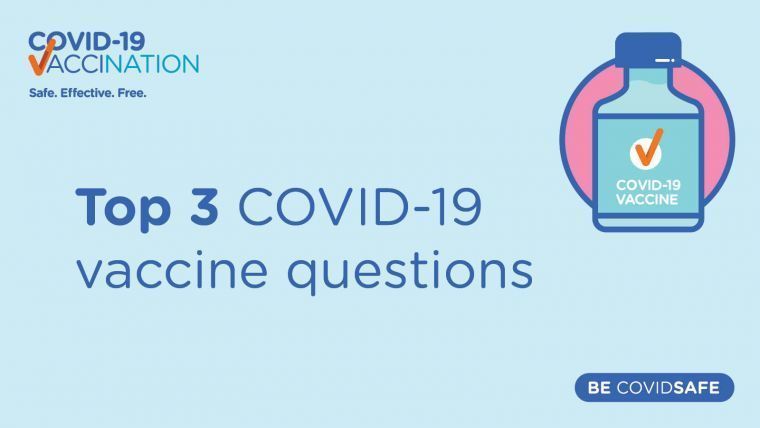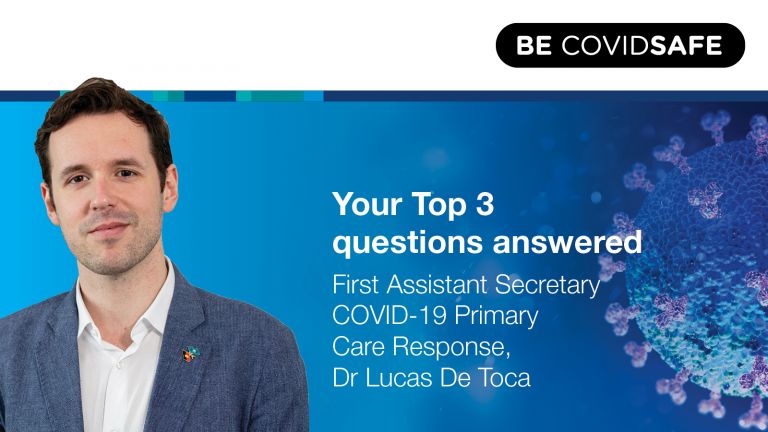
Good morning. I am Dr Lucas De Toca. Welcome to Top 3. I am joined today by Linda who will, as always, do the Auslan interpreting. We are on the land of the Ngunnawal people, so I want to acknowledge their ownership and pay respects to the Elders, both past and present and extend that to the lands where people may be watching from. My shout out today goes to everyone who is going to get their flu vaccine. We are 2 week away, we are almost at winter and so it is important that if we are not due for our COVID-19 vaccine, we get our flu vaccine. As always, it's important to keep two weeks in between any flu vaccine and the COVID-19 vaccine on either dose on either side.
First question, do the COVID-19 vaccines stop transmission?
There is a lot of evidence, to date, on how these vaccines are very effective at preventing severe disease, preventing hospitalisation and preventing death from COVID-19. They are incredibly efficacious at achieving that. And that is the goal of the COVID-19 vaccination program, making sure that the population is protected from severe disease and death from COVID-19, making sure you are protected. However, there is emerging evidence that the vaccines may have a pretty significant protective factor in preventing transmission. We know the vaccines are not 100% effective at preventing getting Covid at all, but they are nearly 100% effective at preventing getting very sick from Covid. Studies in the United Kingdom that are published by the Public Health England, as well as studies looking at how the virus is behaving in populations that have received a high rate of vaccination already, show that both vaccines that are used in Australia, Pfizer and AstraZeneca, are having a pretty significant impact in reducing symptomatic disease and reducing transmission from the virus. So it's really encouraging that this early data including a very large study from Public Health England, with hundreds of thousands of participants in real-life situations, showed a marked reduction on the transmission following vaccination. Again, we will keep monitoring what that looks like and what that means for our public health campaign. We are very certain that the vaccines are very good at preventing severe disease and it's really good to see that more and more evidence is showing that they have significant impact on preventing transmission. But we know, even if you are fully vaccinated, that doesn't not mean that you cannot catch Covid at all, it just means that you have a lower risk of being very sick from it and it appears to be that there is also a lower risk of transmitting the virus onwards, but we will keep reviewing the evidence internationally and domestically and any new information will be regularly updated on health.gov.au.
Second question, is the virus likely to stop mutating at any point?
All viruses mutate and that's a feature of any organism but viruses, by the way they are produced and the way they function, mutate quite rapidly. SARS-CoV-2, the virus that causes COVID-19, is no different. The virus will continue to mutate and we really cannot make any predictions or speculation as to whether the rate will increase or decrease. What we do know is that the more virus there is, the more present the virus is and the more it's circulating and the more people it's infecting, it's reproducing more so the higher the chances are for it to mutate. So that's why Covid vaccination is so important to ensure that the amount of circulating virus reduces, which then, in turn, lowers the likelihood of the virus mutating and lowers the likelihood of new strains emerging.
And finally, what advice should I give someone who says "I'm going to wait to get my COVID-19 vaccine"?
Yeah, and this is a tricky subject but a very common conversation that we're all having in our households with our families, with our friends. There's a lot of talk about COVID-19 vaccines, it's probably the topic of conversation and has been for many months. It is natural to be a bit frustrated or feel a bit upset if someone that you care about is refusing to get a vaccine or doesn't want to get it because you think it's going to protect them. The important thing is that we need to listen to people and their concerns. Vaccines are voluntary, so there's no obligation to get the vaccine. They are strongly encouraged because we know that they're a really important tool in our fight against Covid, and they are very effective at protecting yourself and those around you. It's important that we understand their beliefs and their concerns and their ideas, whether they are right or wrong, that might lead to someone not wanting to get the vaccine and respect what their views are. Then, after listening to their concerns, you might want to volunteer some of the facts or the good reasons you may have to get the vaccine, or you point them out to information from trusted sources such as on health.gov.au and there is a section on the website called 'is it true?' that you can just Google or search it on the search bar on the Department of Health website, that helps address some of the common questions, busts some of the common myths and give you a good clear, concise answers on some of those questions that people are asking, so that might help with those conversations. The key messages, as you know well,
are that the vaccines are very good at preventing people from getting sick or even dying from COVID-19, so they're a really important way to protect ourselves and the community from the pandemic. But ultimately, it's the individual's choice on whether they get the vaccine or not. The website from the Therapeutic Goods Administration, the TGA, which is Australian medicines and therapeutic goods regulator, as well as the website from the National Centre for Immunisation, Research and Surveillance, NCIRS, have really good resources, including plain language resources, that you can use to facilitate those conversations. The National Coronavirus Helpline on 1800 020 080 also has a lot of useful and factual information on the most up-to-date data around the vaccines and COVID-19 in general. Of course, if you need translating and interpreting services, call 131 450. That's all for today. Thank you for watching, thank you for staying CovidSafe and we'll see you next time. Thank you Linda.
Top 3 questions
1. Do the COVID-19 vaccines stop transmission?
2. Is the virus likely to stop mutating at any point?
3. What advice should I give someone who says 'I'm going to wait to get the COVID-19 vaccine'?







